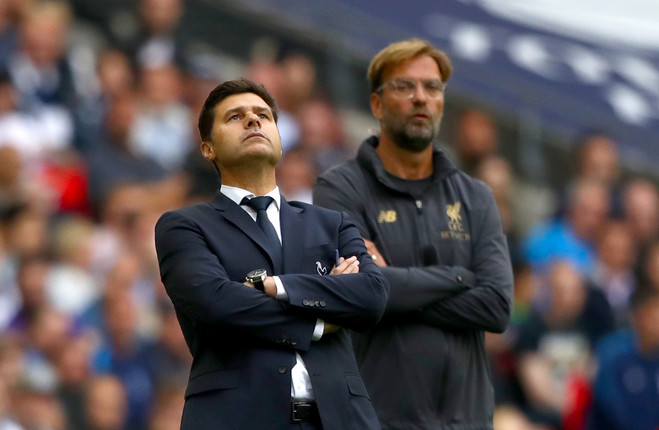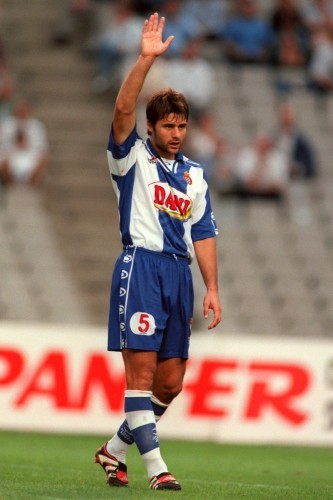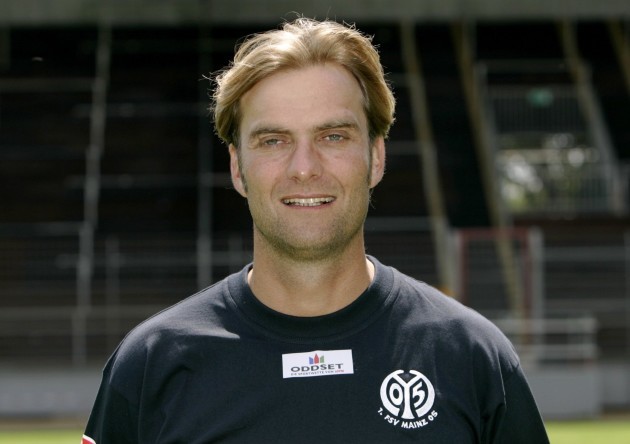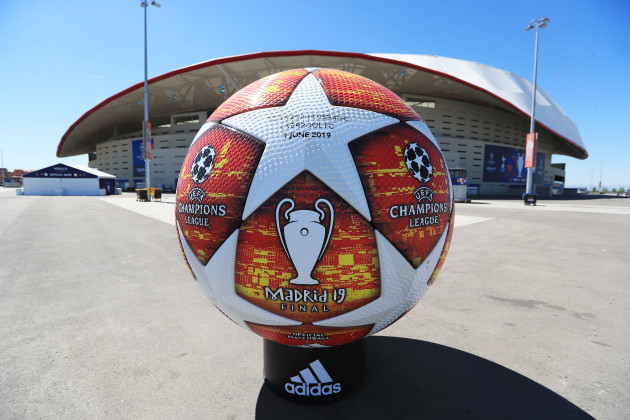MAURICIO POCHETTINO WANTS to know who you really are.
Who we all are, really.
Midway through the 2016/17 season, Daniel Levy brought him and his coaching staff for a week-long break to Lago Escondido in rural Argentina, where they trekked through hills, sailed down rivers, hugged trees, drank from streams and ate good meat.
As they were leaving, Pochettino burst into tears and left a message in the travelling party’s WhatsApp group.
“You can’t hide in Lago Escondido. You can’t conceal who you are. In the middle of nature, all the masks slip.”
When he returned home, his wife explained to him why he was moved to tears.
“My wife made the most beautiful remark on the subject”, he writes in Brave New World.
“‘Do you want to know why you felt so good and it made you cry? Because nature didn’t judge you; because you felt free to be yourself for seven days.’
“She hit the nail on the head. We live in a world where everyone does that very thing: pass judgement.
“When you go to the airport and people look at you, they are judging you in their minds.
“Ultimately, all of us in this world are nothing but actors on a stage.”
**********
Tonight Mauricio Pochettino and Jurgen Klopp will play the roles of managers in a Champions League final.
But if both men are subject to our narrativising and storytelling, part of their managerial successes can be attributed to the stories they tell themselves.
Both believe in God – Pochettino was raised Catholic, Klopp as a Protestant – although the Tottenham manager believes in something further: an “external force that differs from the God of Catholic teaching” as he wrote in his 2016/17 season diary, Brave New World.
He dedicates part of that book to his belief in the power of, if not dreams, then wish fulfillment.
I often say to my sons: ‘Dream, develop the idea before you go to sleep and throw it into the universe. Believe in the stars. Go to sleep and relax.’ Ever since I was a boy, I’ve been convinced that the universe conspires to help you fulfill your dreams.
“That’s the energy source I feel is with me.”
Pochettino has a deep-seated belief in what he terms “universal energy”, which is to be understood as a kind of faith beyond conventional religion, in there being links between everything, all of which happens for a specific reason.
“It is connected”, he told the Guardian in 2017.
“Nothing happens for causality. It is always a consequence [of something else]. Maybe, it is one of the reasons that Harry [Kane] always scores in derbies. I believe in that energy. For me, it exists.”
He has followed this energy for all of his career – choosing, for example, a transfer from PSG to Bordeaux ahead of Villarreal as there was a “very special region in terms of the energy it gives off.”
Pochettino says he can read auras from those in his company, and he uses it to inform the decisions he makes.
He even keeps a bowl of lemons in his office as he believes it absorbs any negative energy people carry with them into the room.
This approach makes Pochettino remarkably sensitive to the world around him – when he is feeling down he will pick himself up by smelling a bottle of Malbec, and when he first took over at Southampton, he tested a series of different detergents on the players’ kits until he was happy the squad had its own signature aroma. (Pre-game, at least.)
This is a belief system that’s no doubt a hard sell to the more proper of Football Men of England, some of whom are still struggling with the heretical notion of ‘rotation’ Rafael Benitez brought with him from the continent in 2004.
But it works for Pochettino, and the idea that a player can be judged quickly and then need only be sufficiently cajoled to unlock something within him rings true from his own playing career.
It took just five minutes of trial game for Marcelo Bielsa to be impressed by Pochettino, after which the current Leeds manager convinced him to sign for Newell’s Old Boys, where he would go on to forge a senior career and call Diego Maradona a roommate.
In his book he recalls a second encounter with Bielsa at Espanyol, where the latter briefly coached before taking the Argentina national team job.
Bielsa told Pochettino he was unrecognisable from the player he saw at Newell’s, haranguing him for falling victim to complacency.
Pochettino agreed, and he is determined to chase off that complacency as a manager, largely through an unrelenting intensity. “If you are not with a high level of activation and preparation, the unconscious mind takes over.
“It is what I call the automatic pilot, a way of behaving and thinking we have been incorporating from birth and takes us away from the things we should be doing.”
Klopp’s belief system, meanwhile, is more conventional. He has gleaned a philosophy of sorts from his Christianity, that the aim in life is to “make it a better place.
“I think it’s only possible to come in the room and try that the people don’t feel worse than before you came in. That’s how I understand life, and that’s what I try to do with a football team.”
This brings with an implicit rejection of anxiety about the past or the future, and Klopp has said separately that living in the present is the only in which you can affect either.
“If you always live in the future, and hope something happens in the future, you forget that you have to change in the future. If you live in the past – maybe it’s nice for old people to look back on nice memories – but we are not in this phase in life. We should do what we can to make things better…being 100% in the moment is the only way to get better in the future.”
It’s the kind of outlook that works at a club like Liverpool, given a number of his predecessors buckled under the weight of the club’s past and the expectations for the future.
Faith also offers a quality evident in the fact that Liverpool have returned to the European Cup final having lost last year’s – persistence.
While his track record as a manager is largely outstanding, it has been afflicted by its fair share of heartbreak. That he has lost his last six cup finals with Liverpool and Borussia Dortmund has been well-documented in the lead-up to today’s game, but Klopp also endured extreme disappointment outside of cup competitions with his first club, Mainz.
Twice in a row they missed out on promotion to the Bundesliga on the final day of the season, the second time on goals scored because of a last-gasp goal by Eintracht Frankfurt in a separate game.
After the game, Klopp invoked his faith. “I don’t believe in a football god, only God. I believe that everything happens for a reason. Someday I’ll find out what today really meant.”
A day later, the desolation began growing into defiance. Before thousands of congregated fans, Klopp roared out the answer to his own question.
“Yesterday I asked myself what it all means, and then I realised: someone has decided that it’s necessary to show people that you really can get knocked down two, three, four times and still get up again, and they thought that there’s no better city for it than this.”
Mainz were promoted on the final day of the following season.
Colin Bell, now the coach of the Republic of Ireland women’s team, was Mainz reserve team manager at the time.
He was alongside Klopp for his address to the assembled public.
“I don’t believe that many managers could come back, but the manager that will always come back is Jurgen Klopp. That’s a test he passed early in his managerial career.
The enthusiasm Kloppo showed, and how he brought everybody in, there was no time to be disappointed with it. ‘Let’s get on and build again, create a new atmosphere’. It’s a personality, a belief, and a strong faith both in his own ability and a faith in a higher entity.
“If you want to tap into that energy, then God is big enough to give you the energy you need.”
**********
When Klopp and Pochettino landed gigs as the managers of Liverpool and Tottenham, they faced a similar brief – not to immediately compete for trophies, but instead to assert an identity for their club.
Klopp had done this successfully at Borussia Dortmund, which had fallen into torpor under his predecessor Thomas Doll.
Prior to Klopp’s arrival, the atmosphere at their famous Westfalonstadion was tetchy and craggy.
“When a pass was intercepted, the sound of 25,000 people falling silent was very loud”, wrote Klopp’s biographer Elmar Neveling.
The art that became known as gegenpressing became Klopp’s tool for tightening bonds between players and supporters.
“When you sit in this stadium with your eyes closed”, he told Dortmund fans, “you should sense there is a passionate team on the field below.”
He repeated the trick at Liverpool, who had completely lost their way under Brendan Rodgers. Klopp recently admitted that his side’s high-octane running was initially a way of provoking Anfield into life, with the nuances of his pressing game tweaked and perfected as time went by.
Pochettino faced a similar issue, and like Klopp, his high-pressing style proved integral.
“Our arrival was part of a process to recover the club’s identity”, he writes in his book. “We have implemented a style that is popular with the fans, we have promoted academy kids and restructured the squad based on our own philosophy.”
In a bar on a pre-season trip to Australia in 2016, Pochettino realised this was working. He and his management team were having a drink when they were approached by a Spurs fan from Malaysia.
The supporter spoke of the 2-2 draw at Chelsea months earlier, the result which handed Leicester City the title and briefly made Jamie Vardy’s the most exclusive private party on the planet.
The fan cried that night, but told Pochettino of how his pride in seeing how sharply failure had stung the Spurs players, which in the fan’s mind showed an enormous culture change from the ‘Spursyness’ of past decades.
Pochettino invited the supporter to the training ground to speak to the players, to remind them of how their behaviour affects supporters even thousands of miles away.
Not that this pressing game is just an easy emotional solvent.
It has proved to be the most successful strategy in disrupting the clinical, bloodless tiki-taka which Barcelona used to conquer Europe.
Within it, however, both managers are flexible.
Pochettino juggles a number of systems, and while Klopp is more closely wedded to a 4-3-3, he has played a 4-2-3-1 and a 4-4-2 diamond at times this season to try and scalpel a way through penalty areas filled with opposition bodies.
As for those tasked with actually carrying it out – both managers cultivate close bonds with them.
As Pochettino told El Pais ahead of the second leg with Ajax: “If there is no emotional bond it is impossible.”
That players fully buy into Klopp and his methods is a practical necessity for his style of play, according to Thomas Hitzelsberger.
“You have to completely accept it. Whoever pulls you back and hesitates endangers the success of the team.”
Pochettino is in constant contact with his players through WhatsApp, and has been known to hold hours-long meetings with them to work through issues. Dejan Lovren grew so close to his manager at Southampton that after he signed for Liverpool, he sent Pochettino a watch with a message reading ‘To my football father.’
Pochettino writes in the diary that he prefers to cultivate leaders rather than rule himself, so he sees no value in imposing fines on players.
This, he says, would be the action of a man who struggles to wield authority. With all of this in mind, the dressing room at the training ground is for players and medical staff only – neither Pochettino nor his staff are allowed access to it.
Klopp has his own definition of leadership – being “close to the human being”, and “giving the right advice in the right moment.”
He maintains a degree of distance – he describes himself as the players’ “friend, not their best friend” – but close bonds have been forged nonetheless.
When it was announced Shinji Kagawa was leaving Dortmund for Manchester United, the player wept with Klopp for 20 minutes, and when Bayern poached Mario Gotze ahead of the Champions League semi-finals of 2013, Klopp was so distraught he cancelled a social engagement that evening.
Tonight, these similarities in style and approach must clash.
**********
And so Mauricio Pochettino and Jurgen Klopp arrive on the greatest stage on them all, knowing this will not be a night sympathetic to processes, luck and the nuance of character.
Nope, because at the end of the night one will play the winner and the other, most harshly of all, the loser.




